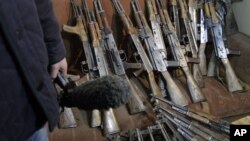Britain, France, Germany and Sweden are urging United Nations members to support a "decisive effort" to regulate conventional weapons trade.
Delegates from more than 150 countries are gathering in New York Monday to begin a month-long meeting to draft a global arms trade treaty.
Ahead of the conference, British Foreign Secretary William Hague, French Foreign Minister Laurent Fabius and German Foreign Minister Guido Westerwelle published a joint statement saying illicit arms trafficking poses a "growing threat to humanity."
Source: UNODA
They say each year millions of people around the world suffer the effects of poorly regulated arms trade.
The statement, also joined by Sweden's trade minister, calls for a "strong and comprehensive framework of common international standards" to prevent legitimate arms sales from being diverted to trafficking networks.
The diplomats note their countries are some of the largest arms exporters in Europe, and say that means they have a special responsibility to ensure the weapons are not used in a way that violates humanitarian aims or international law.
The process to create a legally binding pact regulating the sale of conventional arms has been under way since 2006. The agreement would set standards for importing, exporting and transferring a range of weapons, including tanks, fighter jets and machine guns.
Major arms exporters, including the United States and major importers, such as India, will participate in the conference.
Delegates from more than 150 countries are gathering in New York Monday to begin a month-long meeting to draft a global arms trade treaty.
Ahead of the conference, British Foreign Secretary William Hague, French Foreign Minister Laurent Fabius and German Foreign Minister Guido Westerwelle published a joint statement saying illicit arms trafficking poses a "growing threat to humanity."
The Arms Trade Treaty
What Would the Arms Trade Treaty Do?- Create a more level playing field for global arms transfers
- Require all exporting countries to agree to similar standards
- Fill a gap in efforts to curb the illegal arms trade
- Would not ban or prohibit the export of any type of weapon
- Would not impair states' right to self-defense
Source: UNODA
The statement, also joined by Sweden's trade minister, calls for a "strong and comprehensive framework of common international standards" to prevent legitimate arms sales from being diverted to trafficking networks.
The diplomats note their countries are some of the largest arms exporters in Europe, and say that means they have a special responsibility to ensure the weapons are not used in a way that violates humanitarian aims or international law.
The process to create a legally binding pact regulating the sale of conventional arms has been under way since 2006. The agreement would set standards for importing, exporting and transferring a range of weapons, including tanks, fighter jets and machine guns.
Major arms exporters, including the United States and major importers, such as India, will participate in the conference.
